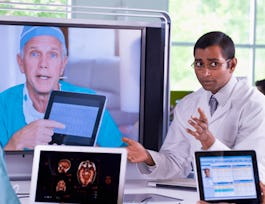This course will help lay the foundation of your healthcare data journey and provide you with knowledge and skills necessary to work in the healthcare industry as a data scientist. Healthcare is unique because it is associated with continually evolving and complex processes associated with health management and medical care. We'll learn about the many facets to consider in healthcare and determine the value and growing need for data analysts in healthcare. We'll learn about the Triple Aim and other data-enabled healthcare drivers. We'll cover different concepts and categories of healthcare data and describe how ontologies and related terms such as taxonomy and terminology organize concepts and facilitate computation. We'll discuss the common clinical representations of data in healthcare systems, including ICD-10, SNOMED, LOINC, drug vocabularies (e.g., RxNorm), and clinical data standards. We’ll discuss the various types of healthcare data and assess the complexity that occurs as you work with pulling in all the different types of data to aid in decisions. We will analyze various types and sources of healthcare data, including clinical, operational claims, and patient generated data as well as differentiate unstructured, semi-structured and structured data within health data contexts. We'll examine the inner workings of data and conceptual harmony offer some solutions to the data integration problem by defining some important concepts, methods, and applications that are important to this domain.


Healthcare Data Literacy
This course is part of Health Information Literacy for Data Analytics Specialization
Taught in English
Some content may not be translated

Instructor: Brian Paciotti
16,859 already enrolled
Included with 
Course
(111 reviews)
Details to know

Add to your LinkedIn profile
4 quizzes
Course
(111 reviews)
See how employees at top companies are mastering in-demand skills

Build your subject-matter expertise
- Learn new concepts from industry experts
- Gain a foundational understanding of a subject or tool
- Develop job-relevant skills with hands-on projects
- Earn a shareable career certificate


Earn a career certificate
Add this credential to your LinkedIn profile, resume, or CV
Share it on social media and in your performance review

There are 4 modules in this course
In this module, you will be able to identify how biological and social systems are features of human well-being and health. You'll be able to describe important organizations in the US healthcare system and be able to discuss specific examples that document high cost and possible waste in the US healthcare system. You'll be able to identify and discuss the knowing-doing gap and be able to describe evidence-based efforts to transform fragmented care processes into coordinated patient-centered activities.
What's included
7 videos1 reading1 quiz3 discussion prompts
In this module, you will be able to compare forms of communication and describe why people us ontologies to describe the world. You'll be able to describe the evolution of standardized railroads in the US and recognize why the evolution of railroad tracks also applies to medical terminologies. You'll be able to analyze a dataset with disease codes and also be able to select which codes refer to specific diseases. You'll be able to match different terminologies with different descriptive domains as well as be able to contrast the different ways of organizing information into hierarchies or other categories.
What's included
6 videos1 quiz4 discussion prompts
In this module, you will be able to identify different types of medical processes and be able to explain why specific data formats emerged from these varied processes. You'll be able to list numerous data types that are found within EHRs and link specific clinical processes that created these outputs. You'll be able to trace why various types of administrative data are collected and describe the value of this data for analytics. You'll be able to identify the common ways that gene sequences are stored in computer readable files and be able to describe how big data formats are different than common relational database technologies that require a lot of data modeling and planning.
What's included
6 videos1 quiz2 discussion prompts
In this module, you will be able to tell leaders and coworkers why they should invest time in creating data dictionaries and other meta-data. You'll be able to describe why one burn registry had data fragmentation issues, and how a variety of standardization and centralization processes helped to achieve data harmony. You'll be able to answer why it is necessary to integrate data, even though the data is coming from disparate sources. You'll be able to perform data mapping as well as communicate the technical terms used to describe and perform record linkages.
What's included
7 videos1 reading1 quiz1 peer review2 discussion prompts
Instructor

Offered by
Recommended if you're interested in Health Informatics

University of California, Davis

University of California, Davis

University of California, Davis

University of California, Davis
Why people choose Coursera for their career




Learner reviews
Showing 3 of 111
111 reviews
- 5 stars
63.96%
- 4 stars
20.72%
- 3 stars
5.40%
- 2 stars
6.30%
- 1 star
3.60%
New to Health Informatics? Start here.

Open new doors with Coursera Plus
Unlimited access to 7,000+ world-class courses, hands-on projects, and job-ready certificate programs - all included in your subscription
Advance your career with an online degree
Earn a degree from world-class universities - 100% online
Join over 3,400 global companies that choose Coursera for Business
Upskill your employees to excel in the digital economy
Frequently asked questions
Access to lectures and assignments depends on your type of enrollment. If you take a course in audit mode, you will be able to see most course materials for free. To access graded assignments and to earn a Certificate, you will need to purchase the Certificate experience, during or after your audit. If you don't see the audit option:
The course may not offer an audit option. You can try a Free Trial instead, or apply for Financial Aid.
The course may offer 'Full Course, No Certificate' instead. This option lets you see all course materials, submit required assessments, and get a final grade. This also means that you will not be able to purchase a Certificate experience.
When you enroll in the course, you get access to all of the courses in the Specialization, and you earn a certificate when you complete the work. Your electronic Certificate will be added to your Accomplishments page - from there, you can print your Certificate or add it to your LinkedIn profile. If you only want to read and view the course content, you can audit the course for free.
If you subscribed, you get a 7-day free trial during which you can cancel at no penalty. After that, we don’t give refunds, but you can cancel your subscription at any time. See our full refund policy.

